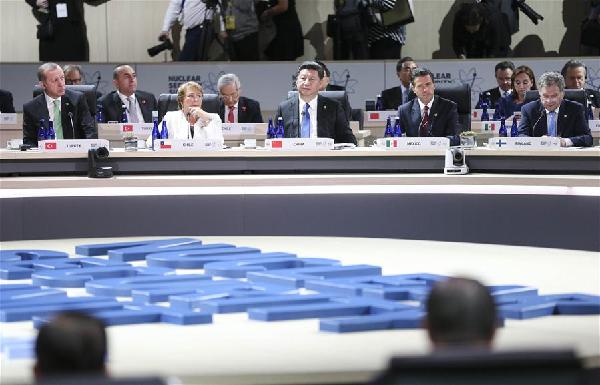Jointly cope with international nuclear security challenges
- By Zhao Minghao
 0 Comment(s)
0 Comment(s) Print
Print E-mail China.org.cn, April 5, 2016
E-mail China.org.cn, April 5, 2016
|
|
|
Chinese President Xi Jinping attends the fourth Nuclear Security Summit in Washington D.C., the United States, April 1, 2016. (Xinhua/Lan Hongguang) |
The Fourth Nuclear Security Summit is held in Washington D.C from March 31 to April 1. Personally advocated by United States President Barack Obama, the nuclear summit has been convened once every two years since 2010. Obama also intends to make it one of his major political legacies. Though Obama made the proposal to build a "nuclear-free world" in 2009 and won a Nobel Prize because of it, the truth is international nuclear security has been deteriorating. No matter who is elected the next US president, the US will face the most complicated and thorny nuclear security conditions since the end of the Cold War.
It was the US itself that has made the prospect of a "nuclear-free world" drifting increasingly farther from reality. The Obama administration on one hand advocates a "nuclear-free world", on the other hand is engaging in large-scale upgrade of US nuclear arsenal, trying hard to consolidate and expand its security advantages in the nuclear field. According to the scheme proposed by the Obama administration, in the next 30 years, the US will spend about $1 trillion on improving nuclear arsenal, including renewing 12 nuclear submarines and hundreds of nuclear bombs. The US has not passed the Comprehensive Nuclear Test Ban Treaty to date.
In addition, US allies seem not that enthusiastic about a "nuclear-free world". The Cameron government in Great Britain is making all-out efforts to purchase new nuclear-powered submarines, so that the country could achieve brand-new maritime nuclear deterrence around 2030. Japan is peddling its nuclear capabilities to countries like India. If Japan offers India special treatments in such aspects as nuclear power technologies, it will undoubtedly create fresh difficulties for the nuclear non-proliferation regime.
Of course, worsening US-Russia relations have tremendously aggravated international nuclear security challenges, and Russian leaders will not attend the nuclear security summit in Washington. Since Russia has inherited nuclear capabilities from the Soviet Union, it has been playing a substantial role in international nuclear non-proliferation. However, such factors as the Ukraine crisis and conflicts in Syria have made US-Russia wrangling increasingly fierce. So much so that Russia even suspects a "New Cold War" has begun. The Putin government has strongly criticized US hegomonistic mindset regarding nuclear security. US-Russia nuclear disarmament negotiations have thus stopped completely.
Like China, Russia believes the US has broken global strategic stability by deploying anti-missile systems in Europe and Asia. The US has even deployed tactical nuclear weapons on Russia's doorsteps. In fact, under current technological conditions, it is very easy to transform missile defense into missile attack. Therefore, absolute security for the US means insecurity for other countries.




Go to Forum >>0 Comment(s)